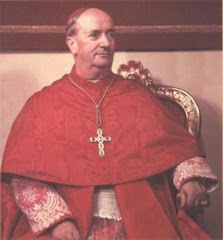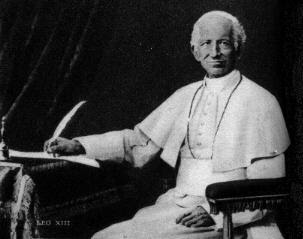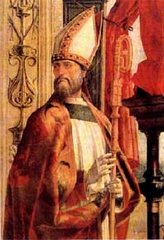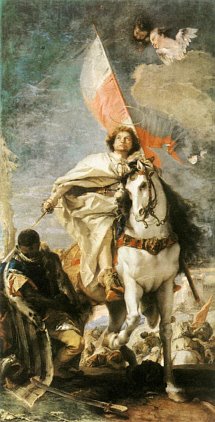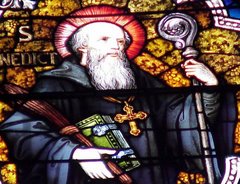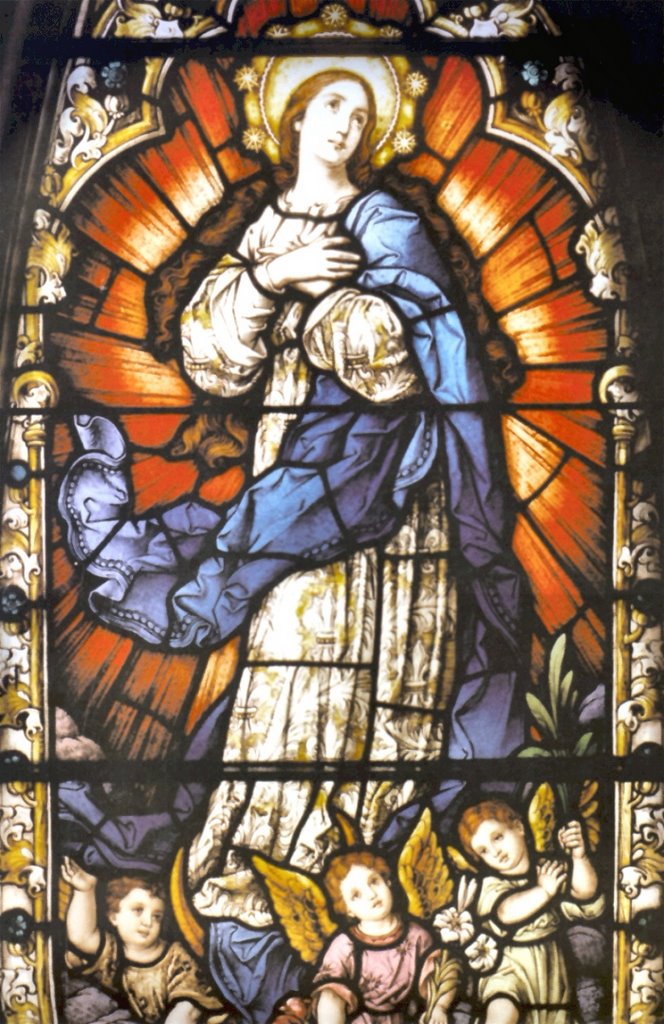An Examination of the Shocking Similarities Between the New Mass and Luther's "Mass"
by Archbishop Marcel Lefebvre
by Archbishop Marcel Lefebvre
Ladies and Gentlemen,
I wish to speak to you this evening about the evangelical Mass of Martin Luther, and of the striking resemblance between his Liturgical innovations of more than four centuries ago, and the recently promulgated new order of the Mass, the Novus Ordo Missae.
Why are such considerations of significance? Because of the prominent role, according to the President of the Liturgical Commission himself, accorded to the concept of ecumenism in bringing about these reforms. Because, further, if we are able to ascertain that a close relationship does indeed exist between Luther's innovations and the Novus Ordo, then the theological question, that is the question of the faith, must be asked in terms of the well known adage, "lex orandi, lex credendi"; the law of prayer cannot be profoundly changed without changing the law of belief.
It is well, in order to assist our understanding of the present liturgical reforms, to examine carefully actual historical documents on Luther's reforms.
To grasp Luther's goal in bringing forward his reforms we must briefly recall the Church's doctrine with respect to the Priesthood and the Holy Sacrifice of the Mass.
The 22nd session of the Council of Trent (1562) teaches that Our Lord Jesus Christ, wishing His Priesthood to continue after His death on the Cross, instituted at the Last Supper a visible Sacrifice destined to apply the salutary effect of His Redemption to the sins of mankind. Christ therefore, instituted Holy Orders, and choosing His Apostles and their successors to be the priests of the New Testament, marked them as such with a sacred and indelible character.
This Sacrifice instituted by Christ is performed on our altars by the sacrificial action of the Redeemer Himself, truly present under the species of bread and wine, offering Himself as a victim to His Father. And by partaking at Communion of this Victim, we unite ourselves to the Body and Blood of Our Lord, and offer ourselves also in union with Him.
Thus, the Church teaches, first, that the Priesthood of the priest is essentially different from that of the faithful, who do not have the Priesthood but who belong to a Church which essentially requires a Priesthood. It is deeply fitting that this Priesthood be celibate, and that its members be differentiated from the faithful by clerical dress.
Secondly, the essential liturgical act performed by this Priesthood is the Holy Sacrifice of the Mass, different from the Sacrifice of the Cross only in that the latter was a bloody sacrifice, and the former is an unbloody sacrifice. The Sacrifice of the Mass is accomplished by the sacrificial action of reciting the words of the Consecration, and not simply by reciting a narrative, or by a remembrance of the Passion or of the Last Supper.
Thirdly, it is by virtue of this sublime and mysterious act that the effects of the Redemption are applied to the souls of both the faithful on Earth and the souls in Purgatory. This doctrine is most admirably expressed at the Offertory of the Mass.
Fourthly, the Real Presence of the Victim is thus required, and comes to pass through the change of the substance of bread and wine into the substance of the Body and Blood of Our Lord. Accordingly, we are required to adore the Eucharist and reserve for it the very highest respect, whence comes the tradition that priests alone distribute the Holy Eucharist and see to Its custody.
It follows, finally, that although a priest celebrates the Mass and takes Communion alone, yet he performs a public act, a sacrifice equal in value to any other Mass, and of infinite value to both the celebrant and the entire Church. Privately celebrated Masses, accordingly, are highly encouraged by the Church.
The above principles are the basis of the prayers, the music and the ceremonies which have made the Latin Mass of the Council of Trent a veritable liturgical jewel. The Council of Trent's deeply moving doctrine on the Canon, the most precious element of the Mass, states:
"As it is becoming that holy things he administered in a holy manner and of all things this Sacrifice is the most holy, the Catholic Church, to the end that it might be worthily and reverently offered and received, instituted many centuries ago the Holy Canon, which is so free from error that it contains nothing that does not in the highest degree savor of a certain holiness and piety and raise up to God the minds of those who offer. For it consists partly of the very words of the Lord, partly of the traditions of the Apostles, and also of pious regulations of holy Pontiffs." (Acts of the Council of Trent, session 22, chapter IV).
Let us examine the manner in which Luther achieved his reform of the liturgy, that is implemented the "evangelical Mass", as he himself called it. Of particular interest in this effort are the actual words of Luther himself, or of his disciples, with respect to the reforms. It is enlightening to note the liberal tendencies which inspire Luther:
In first place", he writes "I would kindly and for God's sake request all those who see this order of service or desire to follow it: do not make it a rigid law to bind or entangle anyone's conscience, but use it in Christian liberty as long, when, where, and how you find it to be practical and useful."(T,C. Tappert, ed., Selected Writings of Martin Luther, vol. 3,p. 397). "The cult", he continues, "was formerly meant to render homage to God; henceforth it shall he directed to man in order to console him and enlighten him, Whereas the sacrifice formerly held pride of place, henceforth the most important will be the sermon". (from Léon Christiani, Du luthéranisme au protestantisme (1910), p. 312)
In 1520, Luther wrote "To the Christian Nobility of the German Nation Concerning the Reform of the Christian State", in which he attacks the Romanists and urges the convocation of a free council:
"The first wall built by the Romanists is the distinction between the clergy and the laity. It is pure invention that pope, bishop, priests, and monks are called the spiritual estate while prince', lords, artisans and peasants are called the temporal estate. This is indeed a piece of deceit and hypocrisy. All Christians are truly of the spiritual estate, and there is no difference among them except that of office... The pope or bishop anoints, confers the tonsure, ordains, consecrates, and prescribes garb different from that of the laity. He might well make a man into a hypocrite in so doing, but never a Christian or a spiritual man... Whoever comes out of the water of baptism can boast that he is already a consecrated priest, bishop, and pope, although of course it is not seemly that just anybody should exercise such office". (Tappert, Ibid., vol. 1, 23-65)
It was from this doctrine that Luther concluded against both clerical garb and celibacy. He and his disciples, in fact, showed the way by marrying.
How many of the reforms of Vatican II reflect Luther's own conclusions? The abandonment of clerical and religious dress, widespread marriages of the religious sanctioned even by the Holy See, the suppression of distinctions between priest and layman. This egalitarianism is further manifested in the sharing of liturgical functions formerly reserved to the Priesthood.
The abolition of the minor orders and the sub-diaconate, and the creation of a married diaconate, have also contributed to the purely administrative conception of the priest, to the detriment of his essentially priestly character, Thus one is ordained primarily to serve the community and no longer for the purpose of offering Christ's Sacrifice which alone is the justification for the Catholic concept of the Priesthood.
Worker priests, priests in labor unions, or in positions remunerated by the State similarly contribute to the blurring of distinctions between Priesthood and laity. In fact, the innovations go much further than those of Luther.
Luther's second grave doctrinal error flows from the first and is founded upon its guiding principle: salvation comes from faith and confidence in God alone, and not from good works. thus negating the value of the sacrificial act which is the Catholic Mass.
For Luther, the Mass is a sacrifice of praise, that is an act of praise, of thanksgiving, but most certainly not an expiatory sacrifice which recreates the Sacrifice of Calvary and applies its merits.
Describing the liturgical "perversions" he observed in some monasteries, he wrote: "The Principal expression of their cult, the Mass, surpasses all impiety and abomination in that they make of it a sacrifice and a good work. Were this the only reason to leave habit and convent and abandon the vows, it would be amply sufficient". (Christiani, p. 258)
For Luther, the Mass, which is meant simply to be a communion, has been subjected to a triple bondage: the laity has been deprived of the use of the chalice, they have been bound as to a dogma to the Thomistic opinion on transubstantiation, and the Mass has been made into a sacrifice.
"It is, therefore, clearly erroneous and impious", he declared, "to offer or apply the merits of the Mass for sins, or the reparation thereof, or for the deceased. Mass is offered by God to man, and not by man to God". (Christiani)
"With respect in the Eucharist, since it ought first and foremost to move one to the Faith, it is fitting that it be celebrated in the vernacular in order that all may comprehend the grandeur of God's promise to man". (Christiani, p. 176)
The logical consequence of this heresy was for Luther to abolish the Offertory of the Mass, which expresses unequivocally the propitiatory and expiatory aims of the Sacrifice. Similarly, he abolished a major part of the Canon, retaining only the essential passages as a narrative of Christ's Last Supper. In order better to emphasize the latter event, he added to the formula of the Consecration of the bread the words "quod pro vobis tradetur" ("which will be given up for you"), and deleted both "mysterium fidei" ("the mystery of faith") and "pro multis" ("for many"). He considered that the passages which both immediately precede and follow the actual Consecration of the bread and Wine were essential.
For Luther, the Mass is firstly the Liturgy of the Word, and secondly a Communion. For us that fact that the current liturgical Reforms have adopted precisely these same modifications is nothing short of astounding. Indeed, as we well know, the texts in use by the faithful today no longer make reference to the Sacrifice, but rather to the Liturgy of the Word, to the Lord's Supper and to the breaking of bread, or to the Eucharist. Article VII of the instruction which introduced the new Liturgy reflected a clearly Protestant orientation. A corrected version which followed in the wake of the outraged protests of the faithful remains sadly deficient.
It goes without saying that, added to these substantial alterations, the large number of lesser liturgical modifications have contributed further to the inculcation of Protestant attitudes which seriously threaten Catholic doctrine: the suppression of the altar stone, the use of a single altar cloth, the priest facing the people, the Host remaining on the paten rather than on the corporal, the introduction of ordinary bread, sacred vessels of less noble substances, and numerous other details.
There is nothing more essential to the survival of the Catholic Church than the Holy Sacrifice of the Mass. To play it down is to threaten the very foundation of Christ's Church. The whole of Christian life, and the Priesthood, is founded upon the Cross, and upon the re-enactment of the Sacrifice of the Cross, upon the altar.
LUTHER DENIES TRANSUBSTANTIATION AND THE REAL PRESENCE AS TAUGHT BY THE CATHOLIC CHURCH. For Luther the substance of bread remains. Consequently, in the words of his disciple Melanchton, who strongly opposed the adoration of the Blessed Sacrament, "Christ instituted the Eucharist as a memorial of His Passion. To adore It is therefore idolatry".
It follows that Communion is to be taken in the hand and under both species, which reinforces the denial of the presence of Our Lord's Body and Blood; it is thus normal to consider the Eucharist as incomplete under a single species.
Once again we note the strange resemblance between the present renewal and Luther's Reform. Every recent promulgation on the Eucharist tends towards a lessening of respect, a retreat from adoration: Communion in the hand and its distribution by lay men and lay women; the reduced number of genuflections, which many priests have discontinued altogether; the use of ordinary vessels and ordinary bread, all of these innovations have diminished belief in the Real Presence as taught by the Catholic Church.
One cannot but conclude that, principles being inseparable from practice ("lex orandi, lex credendi"), the fact that the Liturgy of the present day imitates Luther's reforms leads inevitably towards the adoption of the very principles propounded by Luther. The experience of the six years which have followed the promulgation of the Novus Ordo is sufficient proof. The consequences, of this so-called ecumenical effort, have been nothing short of catastrophic, primarily in the area of faith, and especially in terms of the perversion of the Priesthood and the serious decline in vocations, in the scandalous divisions created among Catholics the world over, and indeed in the Church's relations with Protestants and Orthodox Christians.
Protestant concepts on the essential questions of the Church, the Priesthood, the Sacrifice and the Eucharist are irrevocably opposed to those of the Catholic Church. It was for no idle purpose that the Council of Trent was convened, and that the Church's Magisterium has spoken so frequently on these very questions for more than four centuries since Trent.
It is impossible in psychological, pastoral and theological terms for Catholics to abandon a Liturgy which has always been the true expression and sustenance of their Faith, and to adopt in its place new rites conceived by heretics without exposing this Faith to the most serious peril. One cannot imitate Protestantism indefinitely without becoming Protestant.
How many of the faithful, how many young priests, how many bishops even have lost their Faith since the adoption of the new liturgical Reforms? One cannot expect to offend both Faith and nature and not expect that these in turn should reap their own vengeance.
In order to grasp the striking analogy between the two Reforms, it is well worth reading contemporary accounts of the early Evangelical Masses. Leon Christiani's descriptions remain vivid:
"During the night of December 24/25 1521, large crowds began arriving at the parish church... The evangelical Mass was about to begin; Karlstadt goes to the pulpit; he is to preach on the Eucharist. He claims that Communion under both species is obligatory and that prior Confession is not required. Faith alone matters. Karlstadt approaches the altar in secular dress, recites the Confiteor, and begins the Mass proper in the usual manner, up to the Gospel. The Offertory and the Elevation, that is those parts which express the idea of the Sacrifice, are omitted. After the Consecration comes the Communion. Many of the congregation have not been to Confession and many have not fasted, not even from alcohol. They approach the Communion table with the others. Karlstadt distributed the hosts and offers the chalice. The communicants receive the consecrated bread in the hand and casually drink from the chalice. A host falls to the ground and Karlstadt beckons to a lay person to pick it up. The layman demurs, and Karlstadt allows it to remain where it is for the time being, cautioning the congregation, however, not to step on it." (Christiani, p. 281-83)
That same Christmas day another priest in the same district gave communion under both species to about fifty persons, of whom only five had gone to Confession. The rest had received a general absolution, their penance being the recommendation to resist sin.
The very next day - December 26 - Karlstadt announced his engagement to Anna de Mochau. Numerous priests followed suit.
In the meantime, Zwilling, having left his monastery, was preaching at Eilenberg. He had discarded the habit and was now bearded. Dressed in lay clothes, he fulminated against privately celebrated Masses. On New Year's Day, he distributed Communion under both species. The hosts were passed from hand to hand. Several were pocketed by the communicants. One lady, while receiving, allowed fragments to drop to the ground. No one appeared to notice. The faithful helped themselves generously to the chalice.
On 29 February 1522, Zwilling married Catherine Falki. By this time there had occurred a rash of marriages of priests and monks. The monasteries were beginning to empty. Those monks who remained removed all altars save one, destroyed statues and images and even the Holy Oils.
Among the clergy, Anarchy reigned. Each priest celebrated Mass in his own fashion. It was resolved finally to prescribe a new Liturgy with a view of restoring order and consolidating the Reforms.
The order of Mass was set to include the Introit, the Gloria, the Epistle, the Gospel and the Sanctus, followed by a sermon. The Offertory and the Canon were both abolished. Henceforth the priest was to simply narrate the institution of the Lord's Supper, reciting aloud in German the words of the Consecration, and distributing Communion under both species. The Agnus Dei, the Communion prayer and the Benedicamus Domino were sung to end the Mass. (Christiani, p 281-85).
One of the preoccupations of Luther at this time was the institution of a repertory of appropriate hymns. With considerable difficulty he was able to enlist the efforts of lyricists. The Saints feast days were abolished. Generally, however, Luther attempted to minimize out-and-out abolitions. He directed his efforts to retaining as many of the ancient ceremonies as possible, seeking rather to orient their significance toward the spirit of his Reforms.
Thus for a time the Mass retained in large measure its external appearances. The churches retained the same decor and the same rites, with modifications but directed towards the faithful, for henceforth much more attention was to be paid to the faithful than formerly, in order that they, might be conscious of a more active role in the Liturgy: thus, they were to participate in the singing and in the prayers of the Mass. And, gradually, Latin gave way definitively to the German vernacular.
Even the Consecration was sung in German, in these words: "Our Lord on the night He was betrayed took bread, rendered thanks, broke it and gave it to His disciples, saying: Take you and eat of this for this is My Body given up for you. Do this, as often as you shall do it, in memory of Me. In like manner, when the supper was done, taking also the chalice saying; Take you and drink of this for this is the chalice of the new covenant, of My Blood which is shed for you for the forgiveness of sins. Do this, as often as you shall drink of this chalice, in memory of Me."
Thus were added to the Consecration of the bread the words "which is given up for you", and deleted from the Consecration of the wine, the words "the mystery of faith" and "for many".
Do these considerations on the Evangelical Mass not reflect our very feelings towards the reformed liturgy since the Council?
All of these changes which comprise the new Liturgy of the Mass are truly of perilous consequence, especially for younger priests. Not having been nourished with the doctrines of the Sacrifice, of the Real Presence, of Transubstantiation, these no longer have any significance for young priests who, as a result, soon lose the intention to perform what the Church performs. Consequently, they no longer celebrate valid Masses.
Older priests, on the other hand, even when they celebrate according to the Novus Ordo, may still have the Faith of all time. For years they have celebrated Mass according to the Tridentine rite, and in accordance with the intentions of that rite, we can assume that their Masses are valid. To the degree, however, that these intentions disappear, even their Masses may become invalid.
It was intended that Catholics and Protestants draw closer together, but it is evident that Catholics have become Protestants, rather than the reverse.
When five cardinals and fifteen bishops participated recently in a "Council of Youth" at Taizé in France, how were young people to distinguish between Catholicism and Protestantism? Some received Communion from Catholics, others from Protestants.
Recently Cardinal Willebrands, in his capacity as the Holy See's Envoy to the World Council of Churches at Geneva, declared solemnly that we shall have to rehabilitate Martin Luther!
And what has become of the Sacrament of Penance with the introduction of general absolution? Is it truly a pastoral improvement to teach the faithful that, having been granted general absolution, they may receive Communion provided, should they be in the state of mortal sin, that they take the opportunity to go to Confession within the following six months, or year? Who will suggest that this is indeed a pastoral improvement? What concept of mortal sin are the faithful to retain from this argument?
The Sacrament of Confirmation is in a similar situation. A common rite today is to pronounce simply "I sign you with the Sign of the Cross. Receive the Holy Spirit." In administering Confirmation, the bishop must indicate precisely the special sacramental grace whereby he confers the Holy Ghost. There is no Confirmation if he does not say, "I confirm you in the name of the Father..."
Bishops frequently reproach me, and remind me, that I confer the Sacrament where I am not authorized. To them I answer that I confirm because the faithful fear that their children have not received the grace of Confirmation, because they have a serious doubt as to the validity of the Sacrament conferred in their Churches. Therefore, in order that they might at least be secure in their knowledge of the validity of the sacramental grace, they ask that I confirm their children. And I respond to their plea because it appears to me that I may not refuse those who request that their confirmation be valid, even if it may not be licit. We are clearly at a time when divine natural and supernatural law takes precedence over positive Church law when the latter is opposed to the former, when in reality it should he the channel leading to it.
We are living in an age of extraordinary crisis, and we cannot accept its Reforms. Where are the good fruits of these Reforms, of the Liturgical Reform, the Reform of the seminaries, the Reform of the religious congregations? What have all of these General Chapters yielded; what has become of their congregations? The religious life has all but disappeared: there are no more novices, no more vocations!
Archbishop Bernardin of Cincinnati recognized the problem clearly when he declared to the Synod of Bishops in Rome, "In our countries" - he was speaking for English-speaking countries of the world - "there are no more vocations because the priest has lost his sense of identity," It is essential, therefore, that we remain loyal to Tradition, for without Tradition there is no grace, no continuity in the Church. If we abandon Tradition, we contribute to the destruction of the Church.
I have had occasion to say to the Cardinals, "Do you not see that the Council's Declaration on Religious Freedom is a contradiction? Whereas the Introduction states that the council leaves untouched traditional Catholic doctrine, the body of the document is entirely opposed to Tradition: it is opposed to what has been taught by Popes Gregory XVI, Pius IX, and Leo XIII."
We are now faced with a grave choice: either we agree with the Council's Declaration on Religious Freedom, and thus oppose the teachings of the Popes, or we agree with the teachings of the popes, and thus disagree with Vatican II's Declaration on Religious Freedom. It is impossible to subscribe to both. I have made my choice: I choose Tradition. I cling to Tradition over novelty which is merely an expression of Liberalism, the very Liberalism condemned by the Holy See for a century and a half. Now this Liberalism has penetrated the Church through the Council, and its catchwords remain the same; liberty, equality and fraternity.
The spirit of Liberalism permeates the Church today, though its catchwords are thinly veiled: liberty is religious freedom; fraternity is ecumenism; equality is collegiality. These are the three principles of Liberalism, the legacy of the 18th century philosophers and of the French Revolution.
The Church today is approaching its own destruction because these principles are absolutely contrary to nature and to faith. There is no true equality possible, and Pope Leo XIII in his encyclical on freedom clearly explained why.
And fraternity! If there is no Father where shall we find fraternity? If there is no Father, there is no God, how then shall we be brothers? Are we to embrace the enemies of the Church, the Communists, the Buddhists, the Masons?
And now we have word that there is no excommunication for Catholics who become Freemasons. Freemasonry nearly destroyed Portugal; Freemasonry was with Allende in Chile, and is now in South Vietnam. Freemasons see it as important to destroy Catholic States. Thus it was during the First World War in Austria, thus it was in Hungary and in Poland. Freemasonry seeks to destroy the Catholic nations. What is in store for Spain and Italy and other countries in the near future? Why does the Church feel compelled to open her arms to the enemies of the Church?
Now we are bound to pray, to redouble our prayers! We are witnessing an assault by Satan against the Church, as has never been seen. We must pray to Our Lady, the Blessed Virgin Mary, to come to our assistance, for we can have no idea what horrors tomorrow may bring. It is not possible for God to tolerate indefinitely these blasphemies, these sacrileges which are committed against His Glory and Majesty! One need only reflect on the horror of abortion, on rampant divorce, on the ruin of moral law and of truth itself. It is inconceivable that all of this can continue without God punishing the world by some terrible chastisement.
This is why we must beg God's mercy for ourselves and for all mankind, and we must struggle, we must fight. We must fight fearlessly to maintain Tradition, to maintain, above all, the Liturgy of the Holy Mass, because it is the very foundation of the Church, indeed of Christian civilization. Were the true Mass no longer to be celebrated in the Church, the Church would disappear.
We must, therefore, preserve this Liturgy, this Sacrifice. Our churches were built for this Mass and for no other: for the Sacrifice of the Mass, and not for a supper, a meal, a memorial or a Communion. Our ancestors built magnificent cathedrals and churches, not for a meal or a simple memorial, but for the Sacrifice of Our Lord Jesus Christ which continues upon our altars.

